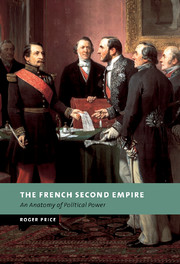Book contents
- Frontmatter
- Contents
- Acknowledgements
- List of abbreviations
- Introduction
- PART ONE THE RISE OF LOUIS-NAPOLEON BONAPARTE
- PART TWO STATE AND SOCIETY
- PART THREE THE RISE OF OPPOSITION
- 8 The context for opposition
- 9 The forms of opposition: (1) Legitimism
- 10 The forms of opposition: (2) Liberalism
- 11 The forms of opposition: (3) Republicans in the aftermath of the coup d'état
- 12 The forms of opposition: (4) The republican revival
- Conclusion to Part III
- PART FOUR WAR AND REVOLUTION
- General conclusion
- Select bibliography
- Index
10 - The forms of opposition: (2) Liberalism
Published online by Cambridge University Press: 14 August 2009
- Frontmatter
- Contents
- Acknowledgements
- List of abbreviations
- Introduction
- PART ONE THE RISE OF LOUIS-NAPOLEON BONAPARTE
- PART TWO STATE AND SOCIETY
- PART THREE THE RISE OF OPPOSITION
- 8 The context for opposition
- 9 The forms of opposition: (1) Legitimism
- 10 The forms of opposition: (2) Liberalism
- 11 The forms of opposition: (3) Republicans in the aftermath of the coup d'état
- 12 The forms of opposition: (4) The republican revival
- Conclusion to Part III
- PART FOUR WAR AND REVOLUTION
- General conclusion
- Select bibliography
- Index
Summary
Liberalism represented a more substantial form of opposition. Most liberals remained monarchists. They included a minority of Legitimists, with such prominent figures as Montalembert, Falloux, and Berryer, and especially the Orleanist supporters of Louis-Philippe and his sons. In general liberals accepted the principles of 1789 – equality before the law, civil liberty, the rule of law, and parliamentary monarchy – as the most effective means of securing the protection of individual freedom, private property, and social order. This was the fundamental line of demarcation between counter-revolutionary conservatism and the Orleanist/liberal tradition. Most liberals, including such eminent figures as Thiers and Charles de Rémusat, regarded democracy with distaste, afraid that it might lead to socialism. Others were more confident in the capacity of educated elites to provide leadership and were prepared to accept manhood suffrage. Increasingly, loyalty to the Orleans family took second place to a more diffuse insistence on principles which were compatible with a variety of constitutional systems. A study of the allegiances of departmental councillors in 1870 identified 157 of these local notables with Orleanism and 248 with liberalism. The former tended to be more intransigent in their opposition to the Empire. They were primarily landowners, professionals, and successful businessmen or bureaucrats who had commenced their careers under the July Monarchy.
- Type
- Chapter
- Information
- The French Second EmpireAn Anatomy of Political Power, pp. 291 - 317Publisher: Cambridge University PressPrint publication year: 2001

